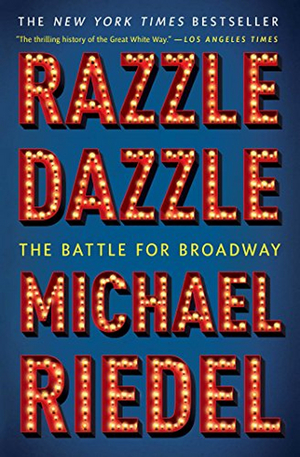BWW Book Club: Read an Excerpt From Michael Riedel's RAZZLE DAZZLE: THE BATTLE FOR BROADWAY - Chapters 13, 14 & 15

BroadwayWorld Book Club is officially off and running! Or should we say, reading!
Our current BroadwayWorld Book Club selection is Michael Riedel's Razzle Dazzle: The Battle for Broadway.
Recap of Chapters 13, 14, & 15
If you would like to join the discussion, you can find a round-up of excerpts and fun facts from chapters 13, 14 & 15 of the book below:
Excerpt from Chapter 13:
A Chorus Line reversed the fortunes of The Shubert Organization. Though the company was not the producer, the rental income from the Shubert in New York, as well as Shubert theaters around the country the show would play on tour, would add up to tens of millions of dollars. The Shuberts could now refurbish decaying theaters and produce other Broadway shows. Shoenfeld and Jacobs ruled an empire that was growing rich.
And, of course, Broadway itself reaped rewards from A Chorus Line. In 1974, attendance was 6.6 million. The next year, when A Chorus Line opened, it shot up to 7.2 million. In 1976, it hit 8.8 million. The "Fabulous Invalid," as Broadway was called whenever it looked to be in trouble, was getting out of her wheelchair.
Decades later, Phil Smith summed up the impact of A Chorus Line this way: "Before A Chorus Line. There was no money. After A Chorus Line there was nothing but money."
Excerpt from chapter 14:
Over the next few years, during his frequent trips to New York to get shows, an idea began taking shape in Jimmy [Nederlander]'s head. John Shubert died in 1962; J.J. the following year. And Jimmy knew that Larry Shubert, the titular head of the company was a boozer.
"There was really nobody to compete against The Shuberts, so I decided I would. I had the training from my father. I was the logical successor to The Shuberts. My father had been their partner. I wanted to be their competitor."
The consent decree barring The Shuberts from buying theaters in New York gave Jimmy his opening. One day day in 1965, walking through Times Square with his friend the producer Joseph Harris, he passed the Palace Theatre on Broadway and Forty-Seventh Street. "You know, RKO wants to sell the Palace. Why don't you buy it?" Harris said.
"Okay," said Jimmy. "Where's the guy?" Harris took Jimmy to the office of RKO president Harry Mandel. Mandel told him he wanted $1.4 million- $400,000 down- for the fifty two-year lease on the theater (the land was owned by two old ladies from the Upper East Side). "Okay, you got a deal," Jimmy told him.

Videos


